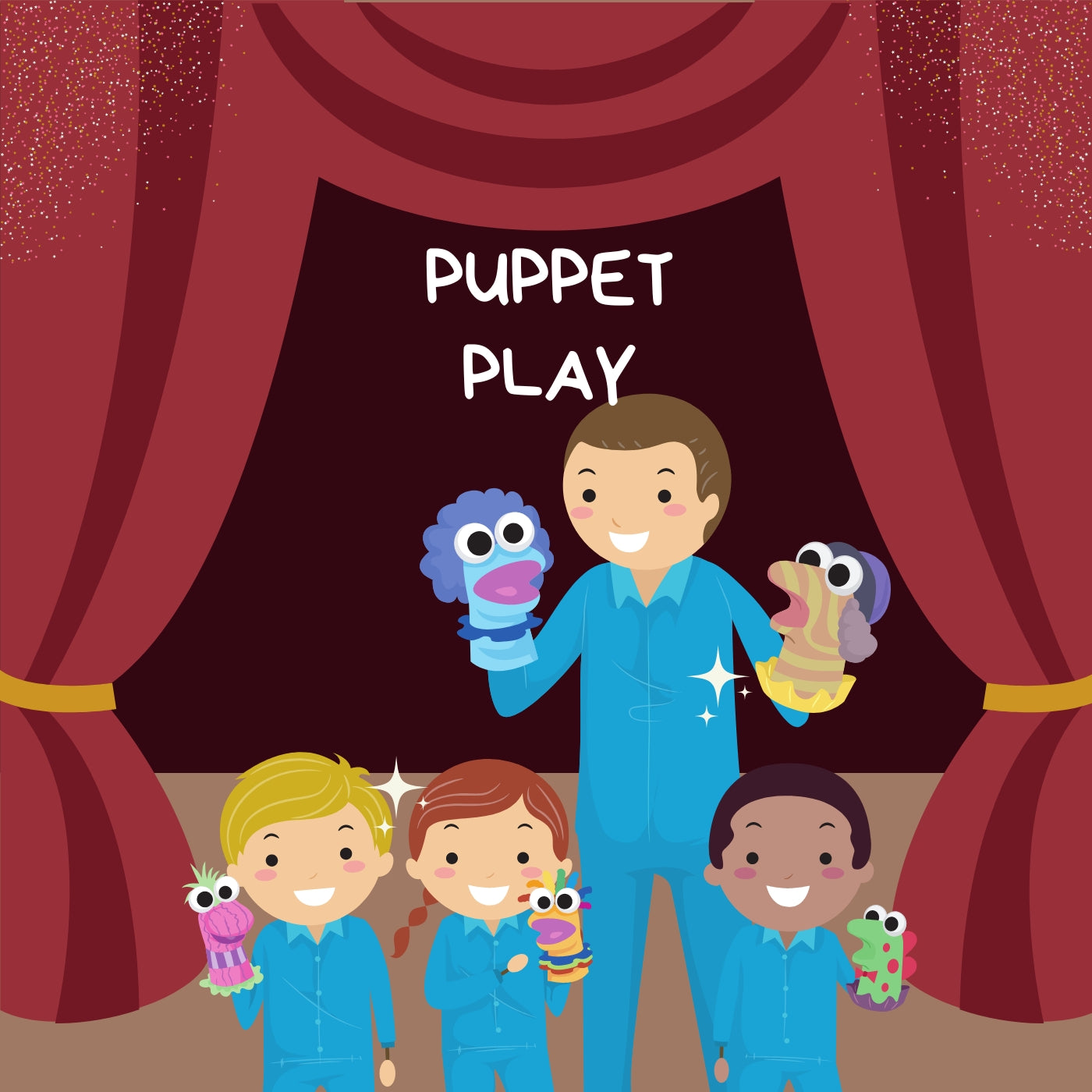
As parents, we all want our children to grow and develop in the best way possible. Playtime is an essential part of a child's development, and it's important to provide them with toys that encourage creativity, imagination, and learning. This is where puppets come in. Puppets provide a fun and interactive way for children to learn and grow. They can help with language development, socialization, emotional regulation, problem-solving, and cognitive development. In this blog post, we will discuss how puppets can help your child's development, and provide tips on how to use puppets to enhance your child's learning experiences. So, sit back, relax, and let's explore the wonderful world of puppets!
1. Introduction to how puppets can benefit your child's development
Puppets have been entertaining and captivating children for centuries. However, did you know that they can also be a powerful tool for your child's development? Puppets can aid in a child's cognitive, social, emotional, and language development. As a parent, it's important to be aware of the many benefits that puppet play can offer your child.
Through puppet play, children can develop their imagination and creativity, as they create stories and scenarios for their puppets to act out. This type of play helps to foster problem-solving skills and critical thinking as children develop storylines and plot twists for their puppet shows.
Puppet play can also help children to develop their social and emotional skills. As they interact with their puppets and other children, they learn to communicate, express themselves, and understand the emotions of others. Puppets can also be used to help children express and work through their own emotions in a safe and non-threatening way.
In addition, puppet play can aid in language development as children practice their vocabulary, storytelling, and listening skills. It can also be helpful for children who may struggle with speech or language delays, as puppets can provide a fun and engaging way to practice communication skills.
Overall, puppet play is a fun and effective way to support your child's development across multiple areas. So next time you see a puppet show or visit a puppet store, consider the many benefits that puppets can offer for your child's growth and learning.
2. The developmental benefits of playing with puppets
Playing with puppets can be a fun and engaging activity for children, but did you know that it also has numerous developmental benefits? Here are just a few ways that playing with puppets can support your child's growth and development:
1. Language Development: When children use puppets to act out stories or create their own scenarios, they are practicing important language skills. They are developing their vocabulary, learning how to express themselves, and improving their language comprehension.
2. Emotional Development: Puppets can be a helpful tool for children to explore and express their emotions. By giving their puppets different personalities and emotions, children can learn how to identify and understand their own feelings and the feelings of others.
3. Social Development: Playing with puppets can also support children's social development. It provides an opportunity for children to practice communication and collaboration skills as they work together to create stories and scenarios.
4. Cognitive Development: Puppets can also support children's cognitive development by encouraging them to think creatively and use their imaginations. By coming up with their own stories and plotlines, children are developing their problem-solving and critical thinking skills.
Overall, playing with puppets can be a valuable activity for children that supports their growth and development in a variety of ways. So why not encourage your child to put on a puppet show today?
3. How puppets can improve social skills and communication
Puppets have been used in education for many years. While they are often seen as mere entertainment, the benefits of using puppets for children's development are undeniable. One of the most significant benefits of using puppets is their ability to improve social skills and communication.
Puppets can help children develop social skills by encouraging them to interact with others. Children often imitate the puppets and create their own stories, which helps them develop their imaginative and social skills. They learn to communicate with their peers and create an environment of shared play.
Furthermore, puppets can help children with communication skills. Children often feel more comfortable talking to a puppet than to an adult, as puppets are non-judgmental and approachable. This can help children who are shy or struggle with communication to open up and express themselves more easily.
Using puppets in play also helps children develop their language skills. As they create stories and interact with others, they learn new words and phrases, and develop their grammar and syntax.
In conclusion, puppets are a fun and effective tool for improving social skills, communication, and language development in children. Incorporating puppets into playtime is an excellent way for parents to support their child's overall development.
4. The use of puppets as a tool for emotional expression and empathy
Puppets can be a great tool to help children express their emotions and develop empathy skills. Children often find it difficult to express their emotions verbally, but using puppets can help make it easier for them to communicate their feelings. Puppets can be used to create scenarios that children can relate to and encourage them to express their emotions through the puppet characters. This can help children to understand and recognize their own feelings, as well as those of others, which can lead to improved emotional intelligence and empathy skills.
Puppets can also be used to teach children how to respond to different emotions and situations. For example, a puppet show can be used to demonstrate how to respond to a friend who is upset or to show the consequences of not sharing with others. Through these scenarios, children can learn how to respond to different situations in a safe and controlled environment.
In addition, puppetry can be a great tool for children who may be shy or have difficulty with social interaction. By using puppets, children can feel more comfortable expressing themselves and can use the puppets as a way to communicate with others. This can help to build confidence and self-esteem, as well as improve social skills.
Overall, the use of puppets as a tool for emotional expression and empathy can be extremely beneficial for children's development. By using puppets, children can learn to express their emotions, understand the feelings of others, and develop important social and emotional skills that will serve them well throughout their lives.
5. How puppets can stimulate creativity and imaginative thinking
Puppets are magical little characters that can capture a child's imagination and take them on all sorts of adventures. Not only are they fun and entertaining, but they can also be an excellent tool for stimulating creativity and imaginative thinking in children.
Puppets allow children to explore their creative side by giving them the freedom to create their own stories and characters. This imaginative play helps children develop their language skills, as they learn to express themselves and communicate with others.
Puppets can also help children develop empathy and emotional intelligence. By giving their puppets personalities and feelings, children can learn to understand and relate to the emotions of others. This ability to empathize is an important life skill that will help them in their relationships with others as they grow up.
Playing with puppets can also help children develop their motor skills and coordination. Manipulating the puppet's movements and expressions requires fine motor skills and hand-eye coordination, which can help improve their physical abilities.
Overall, puppets are a wonderful tool for parents to use in their child's development. They can help stimulate creativity, imagination, language skills, empathy, emotional intelligence, and physical abilities. By incorporating puppets into playtime, parents can provide a fun and educational experience for their children.
6. The use of puppets in storytelling and language development
Puppets are an excellent way to encourage storytelling and language development in children. By providing children with puppets, parents can encourage them to be creative and imaginative, and to express themselves in new ways.
Puppets can help children to develop their language skills by providing a fun and engaging way to practice speaking and listening. Children can use puppets to act out stories and dialogues, and to engage in conversations with others. This can help them to develop their vocabulary, sentence structure, and communication skills.
In addition, using puppets in storytelling can help children to develop their narrative skills. They can learn how to structure a story, create interesting characters, and develop a plot. This can help to improve their reading and writing skills, as well as their ability to think creatively and critically.
Overall, puppets are a valuable tool for parents who want to encourage their child's development. By using puppets in storytelling and language development activities, parents can help their children to build important skills that will serve them well throughout their lives.
7. Tips for parents on how to incorporate puppet play into a child's routine
Puppet play is an excellent way to promote child development, and it can be easily incorporated into a child's daily routine. Here are some tips for parents to help their child get the most out of puppet play:
1. Encourage imaginative play: Give your child the freedom to come up with their own stories and characters. Encourage them to use their imagination to create unique narratives and scenarios.
2. Use puppets to teach new skills: Puppets can be used to teach new skills, such as counting, the alphabet, or even basic conversation skills. Use puppets to create fun and interactive learning experiences.
3. Make it a family activity: Puppet play doesn't have to be a solo activity. Get the whole family involved by creating a puppet show together or taking turns performing for each other.
4. Create a puppet theatre: Create a simple puppet theatre using a cardboard box or a table covered in a colourful cloth. This will give your child a dedicated space for puppet play and help to make the experience feel more special.
5. Use different types of puppets: Experiment with different types of puppets to keep things interesting. Hand puppets, finger puppets, and marionettes all offer different possibilities for play.
Incorporating puppet play into your child's routine can be a fun and rewarding way to promote their development. By encouraging their imagination, teaching new skills, and making it a family activity, you can help your child get the most out of their puppet play.
8. Recommended types of puppets for different age groups
Choosing the right type of puppet for your child's age can be important for their development. Here are some recommendations for different age groups:
1. Infants and Toddlers (0-2 years old): Finger puppets and hand puppets are great options for this age group. These types of puppets allow for interactive play and can stimulate your child's sensory development.
2. Preschoolers (3-5 years old): Hand puppets and marionettes are great options for preschoolers. These types of puppets allow for imaginative play and can help improve your child's communication and language skills.
3. Elementary School (6-12 years old): Glove puppets and rod puppets are great options for this age group. These types of puppets allow for more complex storytelling and can help improve your child's creativity and critical thinking skills.
It's important to note that children's interests and preferences may vary, so don't be afraid to experiment with different types of puppets to see what your child enjoys the most. Additionally, always supervise your child during puppet play to ensure their safety. With the right puppet in hand, your child can have hours of fun while also improving their development.
9. How to make your own puppets at home with your child
Making puppets at home with your child is a fun and creative way to bond and encourage their development. Here are some simple steps to make your own puppets at home:
1. Gather your supplies: You'll need materials such as socks, felt, googly eyes, yarn, glue, and scissors.
2. Choose your puppet design: Discuss with your child what type of puppet they want to create. It can be an animal, a character from a book, or even a family member.
3. Start creating: Use the materials you gathered to bring your puppet design to life. For example, cut out felt pieces for the different features, like ears or a nose, and glue them onto the sock. Add googly eyes or yarn for hair. You can also use markers or paint to add details and color.
4. Have a puppet show: Once your puppets are complete, it's time to put on a show! Encourage your child to use their imagination and come up with a story to act out with their puppets.
Making puppets at home not only encourages creativity and imagination, but it also helps develop fine motor skills and hand-eye coordination. It's a fun activity that you and your child can enjoy together while also promoting their development.
10. Conclusion and encouragement for parents to engage in puppet play with their children.
In conclusion, puppet play is an amazing tool for helping your child's development. Not only does it stimulate their imagination, but it also helps them develop their language, social, and emotional skills.
As parents, we should encourage our children to engage in puppet play, and even better, join in with them. It's a great way to bond with your child while also promoting their growth and development.
So why not create your own puppet show? You don't need expensive puppets, a simple sock or glove can do the trick. Use your imagination and let your child lead the way. Whether it's a story about a superhero or a tale from their own imagination, puppet play is a fun and interactive way for both you and your child to spend quality time together.
Incorporating puppet play into your child's routine can have a positive impact on their development and strengthen your relationship with them. So, let's all grab a puppet and get creative with our children!

